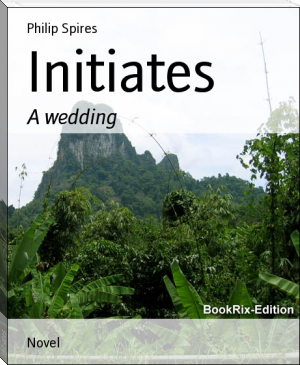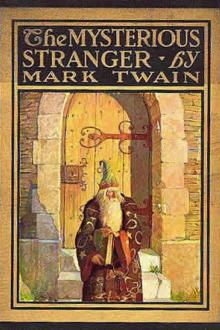Initiates by Philip Spires (popular books to read .txt) 📕

- Author: Philip Spires
Book online «Initiates by Philip Spires (popular books to read .txt) 📕». Author Philip Spires
As Sylvia and Ted took their assigned seats, they could still see one another. Ted still towered above the slight frame of his host, as the latter applied the rules of a protocol of which his guest was unaware. There were perfunctory introductions to make, people to acknowledge on the way to the seat that Haji had pre-determined might be suitable for a European, an orang puteh. It was another five minutes before the orang puteh declined to the seated height of the rest of the men, a five minutes when Sylvie kept her eyes firmly on the reassuring, gangly form of her husband. Haji, who had greeted them at the gate with an indication that the women were to the left and the men to the right, then turned and began to retrace his steps back to the entrance, his relaxed, gentle demeanour spiritedly hurried by the grandeur and significance of the occasion.
Sylvie had gasped when he opened the gate. Never before had she seen a man dressed like that. At only just over five feet in height, Haji could hardly be described as an impressive or imposing presence. But the man who greeted them sported an iridescent purple satin suit, a baju melayu, wrapped around the middle with a gold-embroidered samping, a cloth to cover business district, as Sylvie had taken to describing it. This one, however, a tekat, was opulent beyond anything she had yet seen, the obvious weight of its gold thread snagging the lighter material of his loose suit. And instead of the black songkok she associated with his working dress, today he wore a lightly-wound glittering blue turban, rich fabric that looked to have more gold than thread, despite its assertion of colour.
“He’s like a bird of paradise on display,” she said, whispering to Ted as Haji invited them into the grounds of his house...
“But he has already attracted his mate and bred,” her husband answered. “That’s why we’re here.”
The man on Ted’s left greeted him warmly and shook hands in the accepted manner. Being the kind of Australian male who is unused to doing things by halves, Ted was immediately embarrassed. For him a handshake was an expression of strength, an assertion of presence, of confidence, perhaps control. For Ted, a weak little brush of the fingers of both hands, without grasp, grip or shake was disturbing. To follow this with a finger tip touch of the breastbone as a gesture of sincerity was uncomfortable in the extreme, like asking him to go naked, or to stand in isolated embarrassment. The man also introduced himself, using the title pengiran, the term that Ted had already understood to signify an elevated status, but a status that had no automatic recognition. “I am Ted Coates, plain Mr. Ted Coates,” he said. “I work with Haji’s daughter. This is my first invitation.”
But then, that was why they were here, at this wedding, in this country, to see, feel and experience different cultures, to travel, to experience the world. On Ted’s right, plain, young Adbullah also offered his greeting. Ted accepted, uncomfortably, but second time round he was getting used to the idea of this gentle touching. The people at work were mainly expats, so this was new, despite the fact that Sylvie and he had already been in the country for almost half a year. “These people don’t let foreigners into their lives too easily,” Ted had said to her as he parked their new Corolla amidst the jumbled admixture of luxury cars, discarded apparently at random on the grassy edge of the drainage ditch. “It’s a real privilege to be invited.” The words “Women to the left and men to the right” had sent a jolt of terror through him, however. It was a sting that Sylvia had perceived, sensed not because she shared his dread of isolation, but merely because she knew her husband, could predict his fears.
“Salamat dating,” said Abdullah, as he caressed Ted’s gingerly offered hand, before touching his breast.
“Hello,” Ted repeated, withdrawing, rather than arcing his hand, an adjudged effeminacy he preferred at distance.
“English?”
“Australian.”
“Ah, yes. I was there two years ago. I walked on Bondi Beach.”
“What? You managed to walk along Bondi? Every square inch is usually occupied by Kiwis in tents!” The raucous laugh that followed elicited a mere polite smile from Abdullah.
“What do you do here?”
“I work with the airline – in the same office as Nora, Haji’s daughter. That’s how I know her and I suppose that’s why I was invited.”
“I hope you are enjoying our country,” said Abdullah. Ted was unable to interpret the broad smile that accompanied his neighbour’s still perfunctory manner.
“We are starting to settle in now,” Ted replied. “It was a bit difficult until we got the housing sorted out, but it’s all right now.” In the few seconds the words occupied, Ted recalculated his foreign-denominated salary in Aussie dollars, balanced that against twelve times his monthly mortgage payments on their new house in Brisbane, subtracted what he and Sylvie might need to live on and felt the warmth of the savings excess. “And the job seems to be going well,” apart from the opaque bureaucracy, the layers of useless protocol, the incompetence of my superior and the contradictory policies of management, he didn’t say, the savings balance staying his tongue.
Having greeted the woman on her left, Sylvie realised that she had very little English. There was some conversation in Malay with an occasional English word that served to identify the various dishes set out on the table before them. But it was hardly communication, muted beyond mere politeness, approaching a correctness Sylvie could feel, but not interpret. As she surveyed the rectangle of conforming females, who all sat facing the central tables, set with their covered, as yet untouched food, she was quite suddenly conscious of her drabness. Tropical heat and rain forest humidity had presented an ideological conjunction leading her to light clothing, patterned to hide the sweat, but neutral both in shade and statement, purchased for the occasion from a nearby Chinese supermarket in an attempt not to stand out. Every other woman present, of course, was resplendent in colours she associated only with the foil wrappings of cheap chocolates. They were veritable rainbows of garish hue, thus confining her beiges and browns to a singly occupied ghetto of drabness, an utterly conspicuous hen house sparrow amidst a flock of tropical weavers.
“What is your name?”
Sylvie turned to her right. “Sylvia. Hello. Pleased to meet you,” she replied, offering her hand. The young woman was vast, so big she rendered Sylvie’s early middle age fullness sylph-like in comparison. She wore a baju kurong comprising metre upon metre of purple and green, and topped this with a bright pink tudong. Its statement caught Sylvie’s eye and, for the first time, she became conscious of her own uncovered hair. She felt a little naked.
“I am Zubaidah and this is my mother,” said the woman in stentorian tone. She pointed to the next woman along the line, a minute, wizened, toothless old lady whose angled wrist, offered in greeting across the expanse of her daughter’s breast, was reminiscent of a snapped twig. “Are you English?”
“I suppose I am,” said Sylvie. “I’m Australian really, but my parents were English, from Oldham…” Sylvie had not wanted the conversation to progress. She used the specificity of the place as a full stop, an inserted attempt to call a halt. She did not feel quite comfortable. The ploy immediately backfired.
“Oldham?” repeated Zubaidah at piercing volume, the incongruity of the place name echoing unknown around the group. “I went to university in Salford. I know it well.”
“Actually, I have not been there since I was a child. My parents went to Australia when I was just six years old. I was brought up in Sydney.”
“Have you been here long?”
“About six months. It’s my husband who has the contract. He works for the airline.”
Ted had now occupied his allotted seat for ten minutes. He had checked the passing of each one with a glance at the shining wristwatch he had bought on their last holiday. He had picked it out from a plain but sturdily hinged plywood box full of similar offerings. They had been in a Kuta bar at the time, a genuine Balinese experience with VB on draught, pure nectar savoured only minutes after checking into their beach hotel. Three months of life in this dry country had made that beer taste better than he ever imagined the standard Aussie brew could manage, had lightened his mood, had persuaded him not to dismiss with his usual impatient wave the approach of a smiling hawker. “Genuine imitation” were the words the young man had used when he opened his box of watches and, more for a laugh than anything else, Ted bought a Rolex for ten US dollars. The ones on the wrists around this table were probably genuine, he thought. No matter how much the wristwatch cost, however, time went at precisely the same speed.
Apart from occasional comings and goings, a varied rustle of wind through the nearby shrubs and rare conversations, the organised square of men sat silently, yearning for a drink, non-alcoholic, of course. Sweat had started to trickle down Ted’s rather ruddy neck, tickling its glistened path towards the absorbency of his shirt-front, which was starting to stick. The Javanese batik that he would never dare to wear to a Brisbane bar would not show the patch. But the fabric would not breathe, and he would sweat more. It would stick to the skin.
Haji and three other men had begun a personal greeting of each guest. It was clearly going to take an age, since there were two groups of men, separate but arranged under the same large, free-standing awning. There were, Ted calculated, at least sixty men seated in the pair of squares, each with its own central tessellation of tables spread with a collection of curries and Coca Cola, waiting to be devoured. But Haji and his entourage seem determined to visit each invitee and even converse along the way. “It’s time to dig in for a long innings,” Ted thought at the very moment he truly understood his host’s motive. There was money changing hands. Every guest was offering cash. It was clearly expected. He began to panic. He had only brought five dollars… He could see others handing over twenty or more.
His heart began to beat a little faster and he could feel, even in this heat, a distinct warming at the collar as he self-consciously looked around his own male square to judge reactions, to decide if he dare ask whether the donation was mandatory. Two young men on his right, sitting at right angles to his perspective, near the corner of the square, had their heads bowed. One was in light blue, the other a restrained olive green, both with colour-coordinated samping around the midriff. The tops of their songkoks were perfectly horizontal, as if placed to anticipate the bowed prayer-like angle of their heads. Their hands were clasped just below the crotch, an external jockstrap to support their devout contemplation. “Asleep,” he muttered to himself.
The next three men were all engaged in varieties of activity. The man in brilliant luminescent





Comments (0)